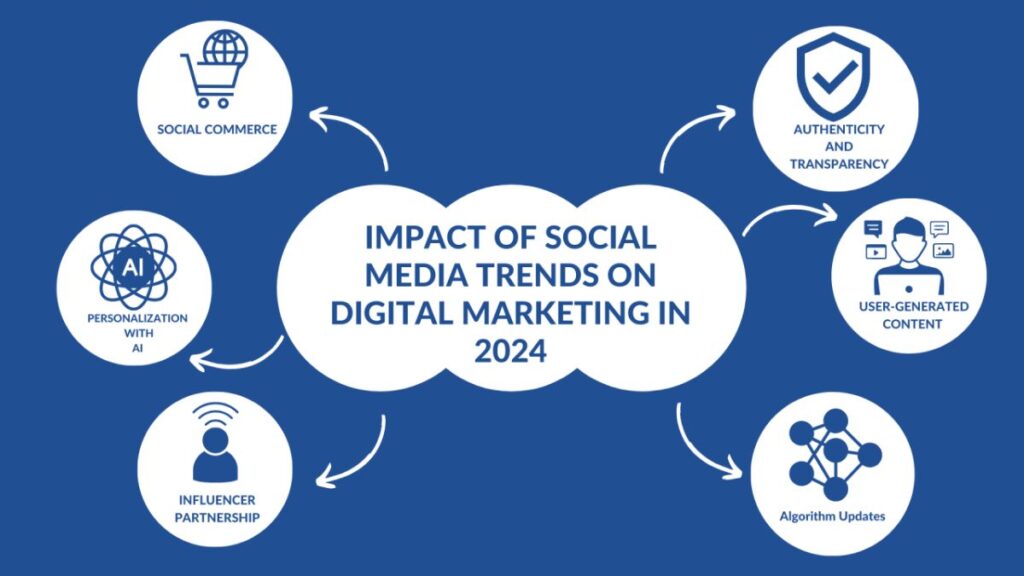In the digital age, social media has become one of the most powerful tools in shaping business marketing strategies. With billions of users globally, platforms like Facebook, Instagram, Twitter, LinkedIn, and TikTok provide businesses with unparalleled opportunities to reach diverse audiences, promote products and services, and engage directly with customers. The impact of social media on business marketing strategies is profound, transforming how businesses approach their target markets, how they communicate their messages, and how they measure success.
The Rise of Social Media in Business Marketing
Social media platforms have revolutionized the way businesses interact with their audiences. What was once a one-way communication channel, where companies broadcasted messages to customers, has now evolved into a dynamic, interactive space where conversations can occur in real-time. This shift has opened up countless possibilities for businesses to connect with potential clients and build lasting relationships.
In the early days of social media, platforms like Facebook and Twitter were primarily seen as spaces for personal interactions. However, as user engagement grew, businesses began to see the potential for leveraging these platforms for marketing. By creating business profiles, companies could directly target specific demographics based on user data, interests, and behaviors. This shift allowed businesses to market products and services in more personalized, meaningful ways, making social media an essential tool in business marketing strategies.
Today, social media marketing is not just a complementary component of business strategy—it’s a central pillar. With billions of active users worldwide, social media platforms provide businesses with the opportunity to reach vast and diverse audiences that were once difficult or expensive to target.
Expanding Reach and Targeting the Right Audience
One of the most significant impacts of social media on business marketing strategies is the ability to reach a larger, more specific audience. Traditional marketing methods such as print ads, radio, and TV could reach wide audiences, but they lacked the precision that social media offers. With social media, businesses can create highly targeted campaigns based on a range of factors, including age, gender, location, interests, behaviors, and even online activity.
For example, Facebook’s sophisticated ad targeting system allows businesses to hone in on their ideal customers by analyzing user behavior. Similarly, Instagram’s visual platform is perfect for businesses that want to showcase products or services in a more creative, engaging way. Social media’s targeting capabilities are also more cost-effective compared to traditional advertising, giving businesses of all sizes the chance to reach their target market without a huge budget.
The ability to tailor ads to specific segments means that businesses can also increase the relevance of their marketing efforts. By delivering content that resonates with the needs and desires of the audience, companies can build trust, enhance customer satisfaction, and ultimately drive sales. Social media has essentially leveled the playing field, allowing even small businesses to compete with larger enterprises by targeting their marketing efforts more precisely.
Building Brand Awareness and Customer Loyalty
Another critical impact of social media on business marketing strategies is its ability to build brand awareness and foster customer loyalty. Social media platforms give businesses a unique opportunity to engage directly with customers. Through regular posts, videos, and customer interactions, companies can keep their audience informed about new products, updates, and promotions while also reinforcing their brand identity.
For businesses, consistency in messaging is key. Social media allows companies to share their values, vision, and culture with their customers. Whether through thought-provoking content, behind-the-scenes glimpses, or user-generated content, businesses can create a narrative that speaks to their brand’s personality. This builds a strong brand presence and cultivates a loyal following.
User-generated content (UGC) is another way businesses can increase brand loyalty. By encouraging customers to share their experiences with products or services on social media, businesses can showcase real-life testimonials that influence others. UGC also fosters a sense of community and involvement, further enhancing the bond between brand and customer.
Companies that actively engage with their social media followers—responding to comments, addressing concerns, and participating in conversations—also build trust. This direct line of communication creates transparency and shows customers that the business cares about their opinions, contributing to greater brand loyalty.
Social Media Marketing and Customer Engagement
Social media offers businesses an unprecedented opportunity to interact with customers in real-time. This level of engagement is a significant departure from traditional marketing channels, where businesses often had limited interaction with their audience. Social media platforms like Twitter and Instagram allow businesses to answer questions, respond to feedback, and resolve issues on the spot, making it an essential tool for customer service.
By using social media to engage with customers, businesses can build stronger relationships and establish a more personal connection with their audience. Whether it’s responding to a comment on a post or addressing a customer’s concern through a direct message, social media allows businesses to show that they are accessible and attentive. This fosters trust and goodwill, which can translate into improved customer retention and advocacy.
Moreover, social media platforms enable businesses to engage with customers in creative, entertaining ways. Contests, polls, quizzes, and interactive live streams can drive engagement, creating memorable experiences that make customers feel more connected to the brand.
Social Media Influencers and Partnerships
The emergence of social media influencers has also had a profound impact on business marketing strategies. Influencers—individuals with large followings on platforms like Instagram, YouTube, and TikTok—have become powerful advocates for brands. By partnering with influencers who align with their target audience, businesses can tap into new markets and increase credibility.
Influencer marketing allows businesses to leverage the trust and authenticity that influencers have built with their followers. When an influencer recommends a product or service, their audience is more likely to take action, as they value the influencer’s opinion. This is particularly true for younger generations, who tend to trust peer recommendations over traditional advertisements.
The key to successful influencer marketing lies in choosing the right influencers who match the brand’s values and target market. Collaborations can range from sponsored posts and product placements to long-term partnerships, all of which can amplify a business’s message and increase brand visibility.
Measuring Success and Analyzing Data
One of the most valuable aspects of social media for business marketing strategies is the ability to track and measure performance. Unlike traditional marketing, where it can be difficult to gauge the effectiveness of campaigns, social media provides businesses with real-time analytics and insights that show how campaigns are performing.
Social media platforms offer tools that measure key metrics such as engagement rates, click-through rates, conversion rates, and return on investment (ROI). These insights allow businesses to make data-driven decisions and adjust their marketing strategies to achieve better results. For example, if a particular ad or post is performing well, businesses can amplify its reach, while underperforming content can be tweaked or abandoned.
Through social media analytics, businesses can also gain deeper insights into their audience’s preferences and behaviors. This helps to refine targeting strategies and personalize marketing efforts even further, ensuring that content resonates with the right people at the right time.
Conclusion: Social Media’s Transformative Role in Business Marketing
Social media has undeniably transformed the landscape of business marketing strategies. From expanding reach and building brand awareness to engaging directly with customers and leveraging influencer partnerships, the impact of social media is both vast and profound. As businesses continue to adapt to the ever-changing digital environment, social media will remain a critical tool in driving growth, enhancing customer loyalty, and staying competitive in an increasingly crowded market.
By embracing social media as a core component of their marketing strategies, businesses can build stronger connections with their audience, deliver more targeted and relevant content, and ultimately drive success in the digital era. The key is to approach social media with authenticity, creativity, and a deep understanding of the audience’s needs and desires. As the landscape continues to evolve, businesses that harness the power of social media will be better positioned to thrive and succeed in the years to come.






